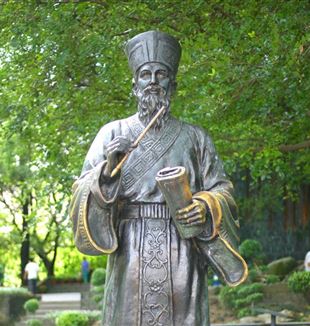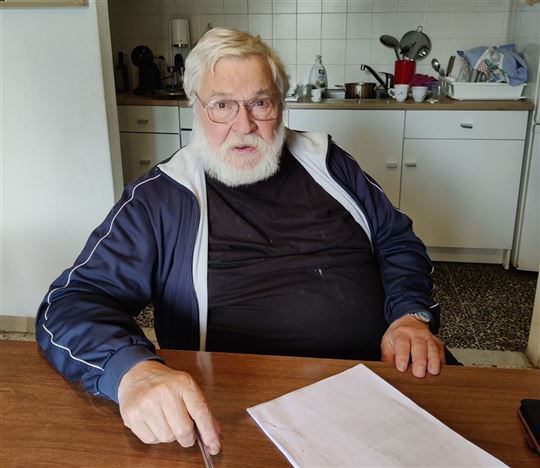
“Love given for the sake of love”
The figure of Matteo Ricci, the evangelizer in China cited at the Exercises, recounted in the June issue of Tracce by Fr. Antonio Sergianni: “Why did he do what he did, why did he behave as he did? Not to do works, but to bring Christ.”Fr. Antonio Sergianni is 84 years old, has a few aches and pains and many adventures to tell. “I have 84 reasons to be worried and one to be happy about: Christ is risen, and that is my hope,” he clarifies right away. He was born in Tuscany in 1940, was ordained a priest in 1965, and he spent nearly 30 years on mission in China with the Pontifical Institute for Foreign Missions (PIME), before being called to the Vatican by Benedict XVI and then by Pope Francis to the Office for China of the Congregation for the Evangelization of Peoples, which in close collaboration with the Vatican Secretariat of State and the Pope's directives worked on the delicate relations between Beijing and the Church in China.
His life has been marked by meeting some priests, such as Fr. Divo Barsotti, and two missionaries he met during his seminary years. “When I was 12 years old, I decided to become a priest. At the news, my mother said that she already knew, since she had always prayed to our little Madonna, Our Lady of the Children, for me to become a priest. So I entered the seminary. Two years later, two missionaries expelled from China came to visit, within a few months of each other. It was 1954. Both had spent hard time in the Chinese Communist Party prisons. Only the former was sad and angry, while the latter was serene, happy to have suffered for Christ and his Gospel. I was so impressed. His name was Amelio Crotti and he was a PIME missionary. His testimony aroused in me the dream of going to China myself.” Twenty years had to pass, however, before Fr. Antonio could set foot on the Asian continent. Mao's Cultural Revolution, in fact, had brought new waves of violence against Catholics: thousands of missionaries and religious men and women faithful to the Pope were killed, imprisoned or expelled, churches destroyed, Christian symbols burned as the CCP tried to create a national Catholic Church opposed to that of Rome.
During his studies, the young Antonio came across the figure of Matteo Ricci, a Jesuit missionary who died in Beijing in 1610 – the Chinese call him Li Madou and he was declared Venerable by Pope Francis in 2022 – and who is still among the few foreigners publicly remembered and honored in China. His tomb in the Chinese capital is located inside the Marxist-Leninist Academy, a former Jesuit cemetery, which is a regular destination for thousands of tourists and pilgrims. But who was Matteo Ricci? Fr. Sergianni, fascinated by his figure, was not satisfied with the scant information that circulated and after years of research he uncovered a nineteenth-century book in the library of Macerata that includes extensive correspondence between the missionary and his superior and family during his years in China.
More than fifty letters full of passionate love for God, with their timely socio-political judgements that are very profound from a theological and spiritual point of view. “Cartographer, philosopher, mathematician, scholar, translator and keen observer, he was truly a bridge between East and West. Except that all of this is not enough to explain why his message is still so relevant,” the Tuscan missionary explains. “Why did he do what he did, why did he behave as he did? Not to do works, but to bring Christ. That is why he attempted the impossible feat of making contact with the emperor, which he succeeded in doing. He wanted to be able to preach legally in China, and to do that it was necessary to arrange meetings, visits, bring gifts. He did great things, but also suffered greatly. He was accused of trafficking children, one of his companions denounced him for abusing the wife of a local governor…All lies out of hatred for Christians. They attacked his mission, some of his friends died, others became seriously ill. He realized that he had to seek a path of dialogue with Chinese culture. The first book he translated into Chinese, not surprisingly, was a treatise on friendship. A great intuition.”
His actions and those of his companions were also decisive. “Like when they were called to court to testify against the thieves who had attacked their mission: instead of accusing them, they asked for their pardon. Some said, 'We have never heard anyone in our land say that one should do good to those who have harmed them.' Others commented, “From this we can see how Ricci's law is more perfect than ours.’ Some were converted.” For Fr. Sergianni, what remains “is the motivation that sustained him: his total identification with the Chinese people, his passionate study of their customs and traditions, his continuous search for a relationship with the local authorities of the time, his joyful endurance of slanders and assaults. His only driving force was the love of Christ, that mystery we call the Incarnation, that is, the love of God present in the human.”
There is a recurring phrase in Ricci's letters that helps to understand the missionary spirit of the time: “You do it for the love of God who became man for love of me.” That is, love given for the sake of love. And if there is to be suffering, there is no need to be afraid because “God, as they say, gives winter in accordance with the clothes.” The Jesuit would not always be understood, neither in his time, nor in subsequent centuries. His objective was not to baptize thousands of Chinese people. What he really wanted was for his conversion to be deep, real, heartfelt. That is why he was so demanding when he taught the catechism and the sacraments: he could wait up to ten years to baptize a man. The hallmarks of the Jesuit missionary are patient waiting for the other’s steps, and the identification with the other.
In a beautiful letter from 1599, also quoted by Monsignor Giovanni Paccosi at the Exercises of the Fraternity of CL, Fr. Ricci expresses this well: “Regarding what you asked me, that they want to see some news from China of some great conversion, know that I and all the others who are here dream of nothing else day and night [that there might be great conversions]; and for this we are leaving our homeland and dear friends, and we wear the clothes and shoes that the Chinese wear, and we do not speak or eat or drink or live in homes that are not of the Chinese culture.” When Fr. Antonio arrived in Hong Kong in 1980, he faced a very similar situation, and he too learned Mandarin by growing a long Confucius-style beard. The Catholic Church had been silenced during Mao's Cultural Revolution, and Deng Xiaoping’s cautious opening in 1979 allowed some missionaries to enter the country semi-clandestinely. “There was an urgency on the part of the Church to rebuild. In two months I met 27 bishops of churches that had been reopened under the control of the CCP. I still call those men ‘the patriarchs of persecution’ because they had endured torture, forced labor, insults, but they kept saying they were happy.” Just like Ricci four centuries ago and Fr. Crotti in the 1950s.
What kept them going, how was it possible? “The risen Christ sustained them. One who accepts the cross can do so only because he is in love with Christ.” He recalls meeting a bishop sentenced to carry heavy stones for 17 years down the river with other inmates. Years later he was able to reopen his church: 42 people showed up at the door asking to be baptized. “When he asked why, they replied that they wanted to be as happy as he was when he was carrying those bricks. I also met another priest, who saw his parents killed in the square because they were Catholics. And he was sentenced to clean the village latrines. Every once in a while they would try him publicly, they would insult him because of the way he cleaned them. I asked him how he felt, ‘I felt the presence of Jesus Christ near me and the desire to sing. The only reason why I did not sing is because they would beat me harder.”
The stories of these men have got mixed up over the centuries, but the fruits are tangible today: “After so many years, I can say with certainty: we have conquered history. The Church in China still exists, there are about 16 million faithful, and in 2018 a historic agreement was reached between Beijing and the Holy See on the appointment of Chinese bishops, while Maoism is dead. I think of young Chinese people today who are hungry for meaning and are looking for it in Christianity. There has been a crazy economic and technological leap in the last few decades, especially in the big cities, where people are now doing well. But questions about the ultimate meaning of life are not answered by a good salary or the latest technology. This is also why courses in the history of Christianity are in high demand in Chinese universities. Catholicism and the faith of China's Christians are now well established, fortified by the persecutions of the past century.”
Read also - "When the heart rests on God's promises, life flourishes"
Looking back over the entire history of evangelization in China, Fr. Antonio says he has no doubt: “Nothing makes sense without charity, which is the greatest form of love.” In one of his last letters, Fr. Ricci, quoting St. Paul, wrote this clearly: “I have always been very busy in the twenty-six years I have been in China. If it were measured according to my efforts and hardships, I could hope for some good. But as it is measured by charity, in which I am so cold, I sigh continually” (Peking, August 23, 1608). “See, Fr. Ricci knew that God’s glory is not built in the world through works, in things to be done. But in love, in agape. And in going on mission there is nothing that sustains hope like love. Do you know why the patron saint of us missionaries is St. Therese of Lisieux, someone who never left the monastery? Because she loved! Ultimately, the only thing that will count is how much we have loved. Ricci understood this, his companions did too. And to love Christ was to love the people they met on their path. ‘I became a barbarian for God's sake,’ he wrote. This is the spirit that also moved me in my 30 years in China and still does today, now that I am old, here where the Lord is calling me.”